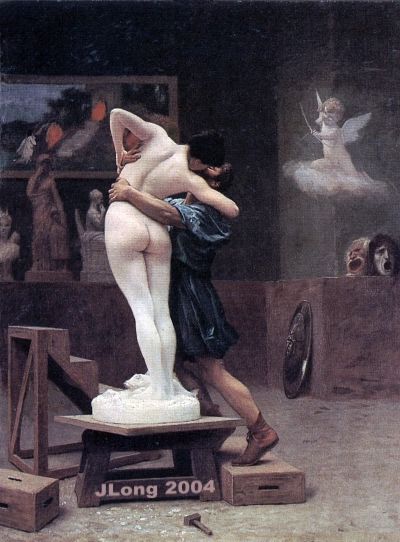Feare turnes a man to Flint. Lethaea's blame
Olenus beares: now stones; their shapes the same.
Vext Cybele to Pine her Atys turnes.
Sweete Cyparissus in a Cypresse mournes.
Enamoured Ioue an Eagles wings displayes;
And louely Ganymed to Heauen conuayes.
Slaine Hyacinthus sighes in his new Flowre.
The cruell Sacrificers by the powre
Of Venus turnd to Bulls. The Prostitute
To Stones. Pygmalion weds the liuing fruite
Of his rare Art. Erigone doth shine
In heauen; converted to the Virgin Signe.
Myrrha, a weeping Tree. Hippomenes
And Atalanta, Lyons. Cyprides
(Inform'd by Mentha's change) her Paramoure
Turnes to a faire, but quickly fading flowre.
Hence, to the Cicones,1 through boundlesse skies,
In saffron mantle, Hymenaeus2 flies:
By Orpheus call'd. But neither vsuall words
Nor chearefull lookes, nor happy signes affords.
The torch his hand sustain'd, still sputtering, rais'd
A sullen smoke: nor yet, though shaken, blaz'd.
Th' euent worse then the Omen. As his Bride3
Troopes with theNaiades4 by Hebrus side;
A Serpent bit her by the heele: which forc't
Life from her hold, and nuptiall tyes diuorc't.
Whom when the Thracian Poet had aboue
Enough bewail'd; that his complaints might moue
The vnder Shades, by Tenarus5 descends
To Stygian floods; and his bold steps extends
By ayrie shapes, and fleeting Soules, that boast
Of sepulture,6 through that vnpleasant coast
To Plutos Court. When, hauing tun'd his strings,
Thus to his harpe the God-like Poet sings.
You Powres that sway the world beneath the Earth,
The last abode of all our humane birth:
If wee the truth without offence may tell;
I come not hither to discouer Hell,
Nor bind that scouling Curre,7 who barking shakes
About his triple browes Medusa's snakes.
My wife this iourney vrg'd: who, by the tooth
Of trod-on Viper, perisht in her youth.
I would, and stroue t' haue borne her losse: but Loue
Won in that strife. A God well knowne aboue:
Nor here, perhaps, vnknowne. If truly Fame
Report old rapes,8 you also felt his flame.
By these obscure abodes, so full of dread;
By this huge Chaos,9 and deepe Silence, spread
Through your vast Empire; by these prayers of mine;
Eurydices too-hastie fate vntwine.
Wee all are yours: and after a short stay;
Early, or late; wee all must runne one way.
Hither we throng; for our last home assign'd:
Th' eternall habitation of man-kind.
She, when her time by nature shall expire,
Againe is yours: I but the vse desire.
If fate deny me this, my second choice
Is here t' abide: in both our deaths reioyce.
While thus he sung, and struck the quauering strings,
The bloodlesse Shadowes wept: nor flattering Springs
Tempt Tantalus, Ixions Wheele stood still;
Their Vrne theBelides no longer fill:
The Vultures feed not; Tityus left to grone:
And Sisyphus sate listning on his Stone.10
The Furies, vanquisht by his verse, were seene
To weepe, that neuer wept before. Hels Queene,11
The King of Darknesse,12 yeeld t' his powrefull plea.
Among the late-come Soules, Euridice
They call: she came; yet halting of her wound.
Giuen Orpheus, with this law: Till thou the bound
Of pale Auernus13 passe, if back thou cast
Thy carefull eyes, thou loosest what thou hast.
A steepe ascent, dark, thick with fogges, they clime
Through euerlasting Silence. By this time
Approach the confines of illustrious Light.
Fearing to loose, and longing for a sight,
His eyes th' impatient louer backward threw:
When she, back-sliding presently with-drew.
He catches at her, in his wits distraught;
And yeelding ayre for her (unhappy!) caught.
Nor did she; dying twice, her spouse reproue:
For what could she complaine of, but his loue?
Who takes her last farewell: her parting breath
Scarce reacht his eares; and so reuolues to death.
Her double losse sad Orpheus stupifi'd;
With equall terror vnto his, who14 spi'd
Three-headed Cerberus: whome feare alone,
Oppressing nature, turn'd into a stone
Or like Olenus, who t' excuse his wife
Accus'd himselfe, and taxt his guiltlesse life:
With thee Lethaea15 whose proud beauty late
Drew on thy selfe and him a cursed fate:
Vnited bodies once; but for thy pride
Now Marble statues on fount-fruitfull Ide.
He kindly (pressing to returne) intreats
The Ferry-man:16 who answeres him with threats.
Vpon the banks seauen daies he sate; forlorne
And comfortlesse; all sorts of food forborne:
Care, griefe of mind, and teares, his only cheare,
Calling the Gods of Erebus17 seuere,
At length to snowie Rhodope18 he hasts;
And Haemus;18 beaten with the northerne blasts.
Now Titan19 thrice had finished his yeares
In waterie Pisces.20 Orpheus still forbeares
The loue of women. Or through bad successe:
Or former vowes. Yet many ne're the lesse
Th' affected Poet seeke; but none inioyes:
Who beauty first admir'd in hopefull boyes.21
A Hill there was; a plaine vpon that hill;
Which in a flowrie mantle flourisht still:
Yet wanted shade. Which, when the Gods Descent22
Sate downe, and toucht his well-tun't instrument,
A shade receiu'd. Nor trees of Chaony,
The Poplar, various Okes that peirce the sky,
Soft Linden, smooth-rinde Beech, vnmarried Bayes,
The brittle Hasel, Ash, whose speares we prayse,
Vnknottie Firre, the solace shading Planes,23
Rough Chesnuts, Maple flect with different granes,
Streame-bordering Willow, Lotus louing Lakes,
Tuffe Boxe whom neuer sappie spring forsakes,
The slender Tamarisk, with trees that beare
A purple figge, nor Myrtles absent were.
The wanton Iuie wreath'd in amorous twines,
Vines bearing grapes, and Elmes supporting Vines,
Straight Seruice trees, trees dropping Pitch, fruit-red
Arbutus; these the rest accompaned.
With limber Palmes, of Victory the prize:
And vp-right Pine, whose leaues like bristles rise;
Priz'd by the Mother24 of the Gods: for shee
Her lust-stain'd Atys25 turned into that tree.
The spyre-like Cypresse26 in this throng appeares.
Of late a Boy: lou'd by that God27 who beares
The siluer bow, and strikes the quauering strings.
Sacred to Nymphs that haunt Carthaean228 Springs
A Stag there was; whose hornes, on high displayde
With spreading palmes, afford his head a shade.
His antlers shone with gold; a carquenet
His neck imbrac't, with sparkling Diamonds set.
A siluer bell vpon his forehead hung
By silken strings, which euery motion rung.
Round pearle, of equall size, from either eare
Hung on his cheekes: who, void of natiue feare,
Frequented houses: and well pleas'd, would stand
The gentle strokings of a strangers hand.
This, Cyparissus, was thy only ioy,
(Of all that Caea29 bred, the fairest boy)
By thee full oft, to change of pasture led:
To purling streames that part the ranker mead.
With various flowres now wouldst thou trick his hornes:
Now on his back (who no such burden scornes)
About the spacious fields in pleasure ride;
And with a purple raigne the willing guide.
'Twas Summer, and high Noone: Daies burning eye
Made Cancers30 crooked clawes with feruor frye.
Vpon the ground the panting Hart was laide
Coole ayre receiuing from the spreading shade.
Whom silly Cyparissus wounds by chance:
And seeing life persue his tun'd-out lance,
Resolues to dye. What did not Phoebus say,
That might a griefe, so slightly caus'd, allay?
He answers him in sighes: this last good-turne
Implores; That he might neuer cease to mourne.
His blood now shed in teares, a greenish hiew
His body dimmes: the locks that dangling grew
Vpon his iuory fore-head, bristling rise;
And pointing vpward, seeme to threat the skies.
When Phoebus; sighing: I for thee will mourne:
Mourne thou for others: Herses still adorne.
Such trees attracting; and inuiron'd round
With birds and beasts, vpon the rising ground
The Poet sits: who, hauing tun'd his strings,
Though dissonant, yet musicall, thus sings.
From Ioue, o Muse,31 my Mother, draw my verse;
All bow to Ioue: Ioues powre we oft rehearse.
And late of Giants32 sung, in loftie straines,
Foil'd by his thunder on Phlegraean33 plaines.
Now, in a lower tune, to louely boyes
Belou'd of Gods, turne we our softer layes:
And women well deseruing punishment,
On interdicted lust, with fury bent
Heauens King, young Ganymed inflames with loue:
There was what Ioue would rather be then Ioue:
Yet daines no other shape then hers, that beares
His awfull lightning in her golden seares.34
Who forthwith stooping with deceitfull wings,
Trust vp Iliades35 by Ida's springs.
Who now, for Ioue (though iealous Iuno scoules)
Delitious Nectar fils in flowing bowles.
And Amyclides,36 thee in azure skies
Had Phoebus fixt; if cruell Destinies
Had not preuented: yet in some sort made
Eternall. For, as oft as Springs inuade
Sharpe winters, and to Aries37 Pisces yeelds:
So oft renu'd, thy Flowre adornes the fields.
My Fathers38 loue to thee did mans excell.
Their president the Delphians misse, who dwell
On round Earths Nauill: while the God of Beames
Haunts wall-lesse39 Sparta, and Eurotas streames.
Now, neither for his Harp, nor quiuer, cares:
Himselfe debasing, beares the corded snares;
Or leader the dogs; or clambers mountaines; led
By Lordly Loue, and flames by custome fed.
Now Titan40 bore his equall-distant Light,
Betweene fore-running and ensuing Night:
When lightned of their garments, either shone
With suppling oyle,41 in strife to throw the stone.
This swinging through the ayre first Phoebus threw:
The obuious clouds dispersing as it flew;
On solid earth, though flying long, at length
Descends; and shewes his art-inabled strength.
Th' imprudent Boy attempts with fatall hast
To take it vp; when Earth, by boundings, cast
The stone, o Hyacinthus, at thy head.
The Boy lookt pale; so lookt the God, who bled
Euen in his bleeding. Raised from the ground;
He sought t' asswage, and dry the bitter wound.
And would with hearbs his flying soule haue stayd:
That wound was cureless; art affords no ayde.
As violets, or lillies louing streames,
Or Poppie, bruzed in their yellow stemmes,
Wither forthwith, and hang their heauy heads;
Nor raise themselues, but bow to their first beds:
So hung his dying lookes; so ouer-swaid.
His limber neck vpon his shoulder laid.
Sweet flow'r said Phoebus, blasted in the prime
Of thy faire youth: thy wound presents my crime:
Thou art my griefe & shame. This hand thy breath
Hath crusht to ayre: I, author of thy death.
Yet what my fault? vnless t' haue playd with thee,
Or lou'd thee (o too well!) offences be.
I would, sweet Boy, that I for thee might die!
Or die with thee! but since the fates deny
So deare a wish; thou shaft with me abide:
And euer in my memory reside.
Our Harpe, and verse thy prayses shall resound:
And in thy Flowre my sorrow shall be found.
A valiant Heroe42 shall in time, to it
Another adde; and in the same be writ.
While thus Apollo truely propheci'd:
Behold! the blood which late the grass had dide;
Was now no blood: from whence a flowre full-blowne,
Farre brighter then the Tyrian scarlet shone:
Which seem'd the same or did resemble right
A Lillie: changing but the red to white.
Nor so contented; (for the youth receiu'd
That grace from Phoebus) in the flowre he weau'd
The sad impression of his sighes: which beares
Ai! Ai! displaid in funerall Characters.
Nor shame to Sparta43 Hyacinth procures;
Whose adoration to this day indures:
For now, as then, they yearely celebrate
The Hyacinthian Feast in solemne State.
Perhaps if Amathus44 you aske (whose earth
Abounds with mettals) if she like the birth
Of her Propoetides;45 she would reply:
As well as theirs, for their impiety,
In former time, with monstrous hornes defam'd:
Whereof they fitly were Cerastae46 nam'd.
Before their doores the tragick Altar stood
Of Ioue the Hospitable;47 stain'd with blood
Of stranger guests. Who had this shambles seene,
Would thinke that blood the blood of calues had beene.
A Guest new sacrific'd; faire Cyprides48
Offended with such cruell Rites as these,
Her townes and Ophiusa's49 fields prepares
T' abandon. Yet said she what guilt of theirs
In me so great a detestation breeds.
Rather with death reward such bloody deeds;
Or exile: if from these extreames they shape,
What middle course, but to transforme their shape?
When musing to what forme, she cast her looke
Vpon the horned Heard; who from them tooke
A resolution so to arme their skulls:
And turnes their mighty limmes to monstrous Bulls.
Yet durst th' obscene Propoetides deny,
O Venus, thy all-ruling Deity.
The first that euer gaue themselues for hire
To prostitution; vrged by thy ire.
Their lookes imboldned, modestie now gone,
Conuert at length to little-differing Stone.
Pygmalion50 seeing these to spend their times
So beast-like; frighted with the many crimes
That rule in women; chose a single life:
And long forbore the pleasure of a wife.
Meanewhile, in iuory with happy art
A Statue carues; so gracefull in each part,
As women neuer equall'd it: and stands
Affected to the fabrick of his hands.
It seem'd a virgin, full of liuing flame;
That would haue mou'd, if not with held by shame.
Such Art his art conceal'd: which he admires;
And from it drawes imaginary fires:
Then often feeles it with his hands, to try
If 'twere a body, or cold iuory.
Nor could resolue. Who kissing, thought it kist:
Oft courts, imbraces, wrings it by the wrist;
The flesh impressing (his conceit was such)
And feares to hurt it with too rude a touch.
Now flatters her; now sparkling stones presents,
And orient pearle (loues witching instruments)
Soft-singing birds, each seuerall colour'd flowre,
First Lillys, painted balls, and teares51 that powre
From weeping trees. Rich Robes her person deck;
Her fingers, rings; reflecting gems her neck;
Pendants her eares; a glittering zone her brest.
In all, shew'd well; but shew'd, when naked, best.
Now layes he her vpon a gorgeous bed:
With carpets of Sidonian purple spred.
Now calls her wife. Her head a pillow prest,
Of plumy downe, as if with sense possest.
Now came the Day of Venus Festiuall:
Through wealthy Cyprus solemniz'd by all.
White heifers, deckt with golden hornes,52 by strokes
Of axes fall: ascending incense smokes.
He, with his gift, before the Altar stands:
You Gods, if all we craue be in your hands,
Giue me the wife I wish: one like, he said,
But durst not say, giue me my iuory Maid.
The golden Venus, present at her feast,
Conceiues his wish; and friendly signes exprest:
The fire thrice blazing, thrice in flames aspires.
To his admired Image he retires:
Lyes downe besides her, rais'd her with his arms;
Then kist her tempting lips, and found them warme.
That lesson oft repeates; her bosome oft
With amorous touches feeles, and felt it soft.
The iuory dimpled with his fingers, lacks
Accustom'd hardnesse: as Hymettian53 waxe
Relents with heat, which chafing thumbs reduce
To pliant former, by handling fram'd for vse.
Amaz'd with doubtfull ioy, and hope that reeles;
Againe the Louer, what he wishes, feeles.
The veines beneath his thumbs impression beat:
A perfect Virgin full of iuyce and heat.
The Cyprian54 Prince with ioy expressing words,
To pleasure-giuing Venus thanks affords.
His lips to hers he ioynes, which seems to melt:
The blushing Virgin now his kisses felt;
And fearfully erecting her faier eyes,
Together with the light, her Louer spies.
Venus the marriage blest which she had made.
And when nine Crescents55 had at full displayde
Their ioyning hornes, repleat with borrowed flame,
She Paphus bore: who gaue that Ile a name.
He, Cinyras begot: who might be stil'd
Of men most happie, if with-out a child.
I sing of Horror! Daughters, farre, o farre
From hence remoue! and You, who fathers are!
Or if my winning verse your minds allure:
Let them no credit in this part procure.
Or if you will beleeue the same for true:
Beleeue with all the iudgements that insue.
If nature could permit so foule a Crime:
I ioy for you55 Ismarians;56 for this Clime;
This world of ours; so distant from that earth,
That gaue to such a cursed Monster birth.
In Costus, Cinnamon; and Amomum,
Rich let Panchaia57 be: let pretious Gum
Sweat from her trees; affected flowers bring forth;
So't Myrrha beare. No new tree of that worth.
Cupid denies t' haue vs'd his darts therein:
And vindicates his flames from such a Sinne.
Alecto,58 with swolne snakes, and Stygian59 fire
That furie rais'd. 'Tis sinne to hate thy Sire:
This Loue, a greater. Princes their abodes
Leaue in all parts; and for thee fall at oddes:
Of all, o Myrrha, make thy choice of one;
So one of all be in that number none.
She knew't: and striuing; to her selfe thus spake:
Ah whether rapt! what is't I vndertake!
O Gods! O Piety! diuine Respect
Of Parents guard me! and this sinne eiect!
If so a sinne it be. No piety
Condemnes such Venus; Natures common tye.
Horses their fillies back, sires Heifers beare;
Gotes kids beget on those whose kids they were:
Birds of that seede conceiue, whereof but late
Conceiu'd themselues: nor they degenerate.
Happie in this are those! But humane care
Hath fram'd malignant lawes: and we who are
By nature free; malitious customes bind.
There is a Nation60 to their blood more kind;
Where sons their mothers, fathers daughters wed;
Affection doubled by their birth and bed.
Woe's me, that there I was not borne! the place
Makes this a crime. What thoughts are these! Hence base,
Hence wicked hopes. Though he all-worthy bee:
Yet, as a father, must be lou'd by thee.
Were I not daughter to great Cinyras;
All I conceiue in my desires might passe.
Now, in that mine, not mine: proximitie
Dis-ioynes vs; neerer, were we not so nigh.
Hence would I fly by vn-returning waies
To shun this sinne: dire Loue my iourney stayes;
To feast my hungrie eyes with his deare sight,
Talke, touch, and kisse; or more, if more I might.
O wicked Virgin, canst thou more propound!
Knowst thou what lawes and names thy lusts confound!
Thy fathers whore! a riuall to thy mother!
Thy owne sonnes sister! mother to thy brother!
Nor fear'st the Furies with their hissing haire,
Who on the faces of the guiltie stare,
With dreadfull torches! From thy soule exile
This mischiefe, ere it actually defile.
Nor with thy horrid lust infringe the law
Of powerfull Nature: but in time with-draw.
Would I, he would not: too too well inclin'd.
O that like furie would inflame his mind!
Thus she. But Cinyras, prest with the store
Of worthie suters who his voice implore;
In his owne choice irresolute, demands
(Their names rehearsing) how her fancie stands.
Shee, thoughtfull silent; gazing on his face,
Flusht with imbosom'd flames, and wept apace.
He, taking this for maiden feare; Desist
From weeping, said: then dri'd her cheekes, and kist.
This too much pleas'd her. Once more asked, who
She best could like: repli'd, One, like to you.
Be still, said he, so pious. At that name
She hung the head, as conscious of her blame.
Twas now the mid of night: when Sleepe bestowes
On men, and on their cares, a sweet repose.
But Myrrha watches, rapt with raging fires;
Retracting her implacable desires.
Despaires, hopes; will not, will; now shames, againe
Desires; nor knowws what course to take. As when
A mighty Oke (now almost feld) his fall
On each side threatens; and is fear'd on all:
Euen so her minde, impair'd with various wounds,
Waues to and fro; and changes still propounds.
No meane, no cure, was left for loue but death:
Death pleas'd. Resolu'd to choake her hated breath;
Vp-starting, to a beame her girdle ties.
Deare Cinyras farewell (she softly cries)
And of my ruine vnderstand the cause.
That said, the noose about her neck she drawes.
Her wakefull Nurses faithfull eares, they say,
A whispering heard: who in the Lobby lay.
Straight rose; vnlockt the doores; the instrument
Of death beholding, schreecht: together rent
Her haire and bosome: and, with trembling haste,
The girdle from her pallid neck displac't.
Now had she time to weepe; t' imbrace her Care:
And aske the cause of such accurst despaire.
She, silent, fixes on the earth her eyes:
And grieues at deaths preuented enterprise.
Baring her hoary haires and empty brest,
The Nurse, by her first food,61 and cradle, prest
Her griefes disclosure. Myrrha turnes aside,
And sighes. The Nurse would not be so denied:
Nor onely promist secrecie; but said:
Tell me, my child, and entertaine my aid.
My old age is not fruitlesse: charmes haue we,
And powerfull med'cines, if it furie be:
If witchcraft; magick shall thy torments ease:
If wrath of Gods; the Gods we will appease
With sacrifice. What can be else surmiz'd?
Thy fortunes by incursions vnsurpriz'd;
Thy mother, and thy father, well? That name
Drew from her soule a sigh, that scorcht like flame.
Nor in the Nurse did this suspition moue
Of such a Crime: and yet she saw 'twas Loue.
Importunate to knowe what least she feares,
Layd in her lap now watred with her teares,
Sh' infolds her in her feeble armes, and said;
I knowe thou lou'st: wherein (nor be afraid)
Thou maist on my sedulity rely:
Nor shall thy father euer this descry.
At that, in furie from her lap she sprung;
Then on the bed her prostrate body flung;
Muffling her guilty lookes: Be gone, she said,
And spare the blushes of a wretched maid.
Still vrg'd: Begone, replyde; or else forbeare
T' inquire of that which is a sinne to heare.
The Nurse lost in amaze: her hands with yeares
And terror trembling (kneeling to her) reares:
Now speakes her faire, now threatens to disclose
(Vnlesse she made her priuie to her woes)
Her purpos'd violence: and vowes to proue
Both secret, and assistant to her loue.
At that, her head she rais'd; her Nurses brest
With weeping bathes: oft stroue to haue confest;
As oft with-held: at length she hid her head;
And said, o Mother, happy in thy bed!
There ends: then grones. The Nurse cold horror shooke;
Now too much knowing: with a gastly looke,
Her hoarie haire star'd on her head: Who said,
What not? that might so foule a lust disswade,
The Virgin could not such a truth deny:
But stands resolu'd, or to possesse, or die.
Liue, said she, and possesse (there stopt, as loath
To say; thy Sire) and bound it with an oath
Now Matrons celebrate the yearely Feast
Of Ceres; whom long linnen stoles inuest:
And offer garlands of their first ripe corne;
Forbidden Venus for nine nights forborne,
And touch of man. In spotlesse ornaments,
With these, the Queene her secret Rites frequents.
Lying alone, the leaudly diligent62
Doth Cinyras, o're-charg'd with wine, present
With proffer of true loue, though falsely maskt:
And prais'd her beauty. Of what age being askt?
Of equall age with Myrrha, she replyes.
When bid to bring her: home in haste she highes;
Reioyce, said she, I bring thee victory.
Th' vnhappy Virgin felt but little ioy;
Such ill successe her troubled Soule diuin'd:
And yet she ioy'd: such discord rackt her minde.
Now Silence ouer all the world did raigne:
And slow Bootes63 had declin'd his Waine.
(To sinne addrest) from heauen bright Cynthia64 flies;
Erigone, Icarius, first remoue:
She65 plac'd in Heauen for her paternall loue.
Thrice stumbled she; the funerall Owle thrice rent
The ayre with ominous shreekes: yet on she went:
By pitchy Night, of modesty bereft.
Her Nurses right hand holding with her left,
And groping with the other hand, explores
Her blind accesse. Now came she to the doores
Of that dire chamber; now the way to sinne
She boldly opens; and now enters in.
Yet blood and courage her at once forsooke;
Her knees, vnknitting, one another strooke:
The neerenesse to her crime remoues desire:
Who now repents, and would vnknowne retire.
Protracting, by the hand the Nurse her led;
And, hauing rendred her vnto his bed,
Here Cyneras, said she, receiue thy owne.
And ioynes their cursed bosoms. He, vnknowne,
His bowels to his bed assumes: and cheares
With comfortable words, her mayden feares:
By chance he call'd her daughter, (being old)
And she him father: that their names might hold.
Now his incestuous bed his daughter leaues.
With wicked seed her cursed wombe conceaues:
Who beares about the burden of her shame:
Next night, and next, and next, re-acts the same
When Cinyras, who longs to see his Louer,
So oft imbrac't; did with a light discouer
His sinne, and daughter. Sorrow not a word
Could vtter: he vnsheaths his shining sword.
Shee swiftly flies: whom nights black shelter shields
From threatned death; and strayes through spacious fields.
Palme-clad Arabia,66 and Panchaea past;
Now hauing wandred by nine Moones, at last
Rest to her wearie limbs Sabaea gaue.
Charg'd with her womb; not knowing what to craue;
Betweene the hate of life, and feare of death,
Those thoughts she vtters with her fainting breath.
You Powers! If Penitency pierce your eare;
I haue deserued, nor refuse to beare,
Your iust inflictions: yet least I prophane
Or those who liue, or who in death remaine,
O banish me from either Monarchie;
That, chang'd by you, I may nor liue, nor die!
Confession some coelestiall pittie found.
Those wishes had their Gods. Euen then the ground
Couer'd her legs: a downe-ward-spreading root
Burst from her toes; whose euer-fixed foot
Sustain'd the lengthfull bole. Bones turne to wood,
To pith her marrow, into sap her blood:
Her armes great branches grow, her fingers spine
To little twigs; her skin converts to rine.
Now her big womb the rising tree possest,
Her bosome folds, and now her neck opprest:
When shee, delay il-brooking, downeward shrunk
And vales her visage in the closing trunk.
Though sense, with shape, she lost; still weeping, she
Sheds bitter teares, which trickle from her tree:
Teares of high honour; these their Mistresse name
As yet preserue, and still shall beare the same.
This ill-got infant, now at perfect groth
Within the tree; indeauours to get forth.
The strict imbracing barke, her belly wrung,
With torment stretcht: nor had that griefe a tongue:
Nor could she call Lucina67 to her throwes:
And yet the tree like one in labour showes;
Bowes downe with paine, and grones, and weeps a flood.
Lucina by her trembling branches stood;
Her hand impos'd, and vtterd powerfull words.
The yawning tree the crying Babe affords
A passage; whom those Nymphs receiue with ioy:
And in his mothers teares annoint the Boy.
Nor Enuy could but praise his beauty: so
The naked Cupids, liuely painted, show.
But, least their habits some distinction make;
A quiuer giue, or his from Cupid take.
Time glides away with vndiscouered hast;
And mocks our hopes: no wings can fly so fast.
He, whom his sister bore, his grandsires son;
Late tree-inclos'd, who lately life begun,
But now a most sweet infant, now as rare,
A boy, now man, now then himselfe more faire.
And now on Venus for his mothers fires
Reuenge inflicts; who dotingly admires.
For kist by quiuer-bearing Loue, his dart
By fortune raz'd her tender brest; with smart
Incenst, she thrust him from her nor then found
The wounds deceitfull depth, yet deep the wound.
Not now Cythera68 could the Louer please;
Nor Paphos,69 grasped with resulting Seas.
High Gnidos,70 Amathus,71 renowned for brasse,
Nor heauen frequents: her heauen Adonis was.
Him woo's, accompanies, besides him lies
In gratefull shades; and striues to please his eyes.
Now like Diana she her selfe attires;
And trips o're hils and rocks, through brakes and briers:
Hollowes the hound; pursuing beasts of chace,
Bucks, high-hornd Harts, and Hares, who fly apace:
But rapefull Wolues, rough Beares, fell Bores eschues;
And Lyons, whom the blood of Beeues imbrues.
And thee Adonis, her misdoubts disswade
From such encounters; had they beene obayd.
Who fly, said she, be bold in following those:
Valour vnsafely copes with valiant foes.
Sweet Boy! subiect not me to fortunes stroke;
Nor cruell beasts by nature arm'd prouoke,
For feare such glory but too costly proue.
Thy youth and beauty, though they Venus moue;
Nor bristled Swine, nor shaggie Lyon touch:
Pitty ne'r pierc't the eyes nor hearts of such.
Bores, in their crooked tushes lightning haue:
And Lyons with impetuous furie raue.
I hate them. Asked why? We will relate
Old crimes, said she, and wonder-striking fate.
But now vn-usuall toyle my strength inuades:
And loe, yon Poplar courts vs with her shades;
The grasse affords a bed: there let vs rest.
When, lying downe, the grasse and him she prest.
Her head now in her Louers bosome laid:
Thus (words with kisses intermixing) said.
Perhaps you of a maid haue heard, who wan
The Prize in running from the swiftest man.
'Tis true; She, won indeed: nor could you tell
Whether her speed or beauty did excell.
Enquiring of a husband; this reply
Apollo gaue. The vse of husband fly
O Atalant! yet thou shalt vainely striue
Against thy fate; and loose thy selfe aliue.
Frighted herewith in shadie woods she liues:
And troopes of pressing Sutors from her driues
With this reply: Except out-runne I be,
I am a wife for no man; Runne with me.
My bed, and I, are both the winners meede:
The Tardie dies. Vpon this law proceed.
She, cruell: yet so powrefull was her looke,
That many a youth the perill vndertooke.
Hippomenes beheld this tragick strife.
Will any through such danger seeke a wife?
(Said He) and taxt their follies that pursewd.
But when her face and naked forme he viewd;
Such as is mine; or Thine, wer't thou a Maid:
Amaz'd! with hands vpheau'd, forgiue (he said)
O you whom late I blam'd! not then I knew
The Prizes worth. Loue still by praising grew:
Who wishes now that none might runne so fast:
Enuies and feares. Why linger, I, nor hast
(Said he) to trie my fortune? Gods still aid
The aduenturous. While this in thought he said;
The Virgin with a winged pace past by.
Though seeming to th' Aonian72 Youth to flye
As swift as Scythian shafts; her forme he more
Admires; by motion louelier then before.
The winde reuerberates her ankles wings,73
And whisks her ham-bound buskins purple strings,
Tossing her haire, on iuory shoulders spred.
Her pure white body so receaues the red;
As when carnation curtaines are display'd
On pure white walls, & dye them with their shade.
While this the stranger viewd, the race was run:
And Atalanta's browes the garland won.
The vanquisht sighe, and pay their forfeiture.
Nor could so sad successe his feare procure:
Who rose; and fixing on the Maid his eyes;
Why seeke you praise by easie victories?
Contend with vs: if we obtaine the Bayes,
Our victory will not eclipse your praise.
Megareus me begot, Onchestius blood;74
He Neptunes, Ruler of the sacred Flood:
Nor we degenerate. My foyle, your name
Will honour; and immortalize your fame.
This while, a wel-pleas'd eye She on him threw:
Nor knowes her wish; to loose, or to subdue.
What God, a Foe to beauty, would destroy
This Youth, said she, who seekes my bed t' inioy
With his lifes forfeiture? If I may be
The iudge, there is not so much worth in me.
Nor is't his beautie moues, though it might moue;
But that a Boy. We pittie, and not loue.
Besides; his courage, and contempt of death!
Who from great Neptunes son75 deriues his birth!
And then, his Loue; content to part with life,
If harder fate denie me for his wife!
Be gon, o Stranger; shun my bloody bed,
While yet thou maist: this Match will loose thy head.
No Virgin is there who would not be thine:
And such would seeke, whose lustres darken mine.
Yet why regard I him, so many slaine?
Looke to thy selfe, or perish: since in vaine
Admonisht by such numbers, whom this strife
Hath sent to death. Th' art weary of thy life.
And must he dye, because hee'd liue with me?
Must death, aduenturous Loue, thy wages be?
This murder will our victory defame;
And purchace hate: yet am not I in blame.
O would thou wouldst desist, and danger shun!
Or since so mad, would thou couldst faster run!
How Boy and Virgin glory in his face!
Ah poore Hippomenes! O would this place,
Th' hadst neuer seene! thou well deseru'st to liue.
Were I more happy, and hard fate would giue
Me leaue to marry; thou art He alone,
To whom my bed and beauties should be knowne.
Thus she: Who raw, and pierc't with loues first touch,
Erres in her thoughts; and loues; nor knewe so much.
Now King and People call vpon the Race:
When Neptunes Issue76 thus implor'd my grace:
O Venus, fauour my attempts, he said:
And those affections, which you gaue me, aid!
This friendly winds conuaid vnto my eare:
I pitty, and no longer helpe forbeare.
A field there is, so fertill none, through all
Rich Cyprus; which they Damascenus call.
Antiquitie this to my Honour vow'd:
And therewith all my Temples had indow'd.
A Tree there flourisht on that pregnant mold,
Whose glittering leaues, and branches, shone with gold.
Three golden apples, gathered from that tree,
By chance I brought: and, so as none could see,
Himselfe excepted, to Hippomenes,
Together with their vse, deliuer'd these.
The trumpets sound. Both from the Barrier77 start:
Whose nimble steps scarce touch earths vpper part.
Their feet, vnwet, the sea might well haue borne:
Or vnsuppressed stalkes of standing corne.
Fauour and Clamor, ioyning in remorse,
The youth thus hearten: Now thy speed inforce;
Make haste Hippomenes; delay decline;
Collect thy powers: the victory is thine.
'Tis doubtfull whether, what the people said,
More ioy'd the Heros or Schaeneian Maid.78
How often lag'd she, when she might o're-goe!
And gazing on him, sigh't t' out-strip him so!
Short breath from panting bosomes scorching flew;
The Gole farre off: when Neptunes Nephew threw
One apple of the three. The Maid admires:
And greedy of the shining fruit, retires
To catch the rowling gold: the Youth past by;
And all the field resounded shouts of ioy.
This hindrance she repaires with winged hast:
Againe Hippomenes behind her cast.
The second fruit, throwne farther then before,
Declin'd her steps; yet him out-strips once more:
The Race now neere an end, he said, o saue!
Great Goddesse, giue successe to what you gaue!
And threw the shining gold another way
With all his vigor; to prolong her stay.
When I compeld her, doubtfull what to doe,
To take it vp; and added waight thereto:
With-held; both by diuerting her pursuit;
And with the burden of the ponderous fruit.
But least my words the Race in length exceed;
She was out-run, and he receiu'd his Meed.
Deseru'd not I both thanks and frankincense,
Thinke you Adonis, for his lifes defence?
He neither gaue. Prouokt with sudden rage
At this contempt; and least the future age
By such examples should my God-head slight;
Against them both I due reuenge excite.
The Fane, erected by Echions79 vow
Vnto the Mother of the Gods,80 they now
Had past; obscur'd by dark and secret shades:
When their long iourney them to rest perswades.
Hippomenes, incensed by my fires;
Here lusteth with vnseas'nable desires.
A gloomie grot, much like vnto a Caue,
Stood neere this Fane; to which light pumice gaue
A naturall couer; by deuotion grac't:
Within this Cell the reuerent Priest had plac't
The wooden Images of ancient Gods:
This entring; he pollutes their chaste abodes.
The Statues wry their lookes. The Mother, crownd
With towres,81 had struck them to the Stygian Sound:82
But that she thought that punishment too small.
When yellow maines on their smooth shoulders fall;
Their armes, to legs; their fingers turne to nailes;
Their brests of wondrous strength: their tufted tailes
Whiske vp the dust; their lookes are full of dread;
For speech, they rore: the woods become their bed.
These Lyons, feard by others, Cybel checks
With curbing bits; and yokes their stubborne necks.
These, o my Deare, and all such kinds of beasts
As will not turne their backs, but bend their brests
T' incounter with the rash Assailant, Shun:
Least by thy courage We be both vndone.
This said: thence flew Shee, rais'd by yoked Swans.
But Valour such admonishments with-stands.
By chance the dogs, pursuing long before
His sented footings, had dislodg'd a Bore.
Whom, rushing from his couert, the bold Youth
Obliquely wounds. The Bore with crooked tooth
Writhes out the iauelin, with his blood imbrude.
Who now his safetie-seeking Foe pursude;
Sheathing his tushes in his groyne: and threw
To earth the dying Boy. The Swans that drew
Idalia's83 waightlesse charriot through the ayre,
Yet reacht not Cyprus: when the heauenly Faire
Thence heard his dying grones; and wheeling round,
Her siluer birds directs to that sad sound.
But when she saw him weltring in his Gore;
Downe iumping from the skies, at once she tore
Her haire and bosome: then her brest inuades
With bitter blowes; and Destinie vpbraids.
Not all, said she, is subiect to your wast:
Our sorrowes monument shall euer last.
Sweet Boy! thy deaths sad image, euery yeare
Shall in our solemniz'd Complaints84 appeare.
But be thy blood a Flowre. Had Proserpine
The power to change a Nymph to Mint?85 is mine
Inferior? or will any enuy me
For such a change? This hauing vtter'd, she
Powr'd Nectar on it, of a fragrant smell.
Sprinkled there-with; the blood began to swell:
Like shining bubbles, which from drops ascend.
And e'r an houre was fully at an end,
From thence a Flowre,86 alike in colour, rose.
Such as those trees87 produce, whose fruits inclose
Within the limber rine their purple graines.
And yet their beauty but a while remaines:
For those light-hanging leaues, infirmely plac't,
The winds, that blow on all things, quickly blast.
Book X
Myths In Book II
Orpheus and Eurydice The Propoetides
The Gathering of Trees Pygmalion
Cyparissus Myrrha
Orpheus' Song Venus and Adonis
Ganymede Hippomenes and Atalanta
Hyacinthus
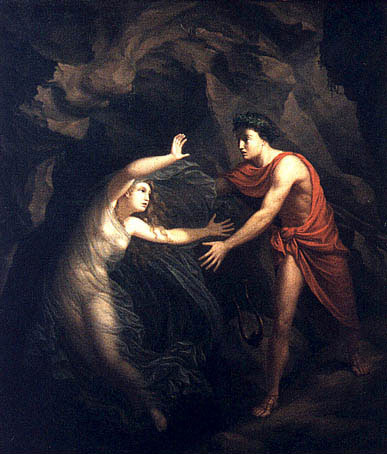
Christian Gottlieb Kratzenstein, Orpheus and Eurydice, 1806
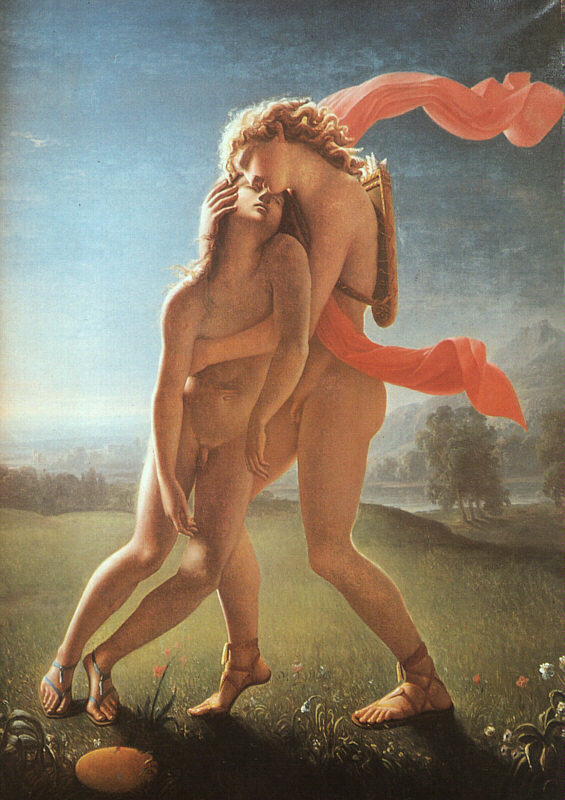
Jean Broc, The Death of Hyacinthos, 1801
[1].jpg)
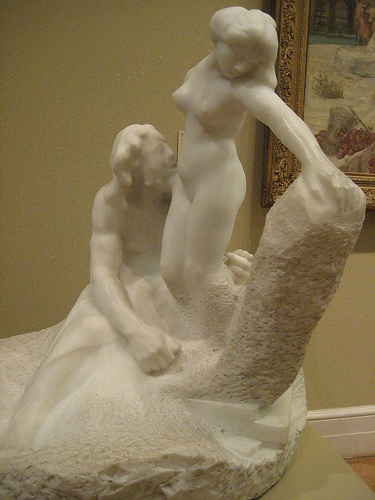
Auguste Rodin, Pygmalion and Galatea, 1908
Honore Daumier, Pygmalion, 1842
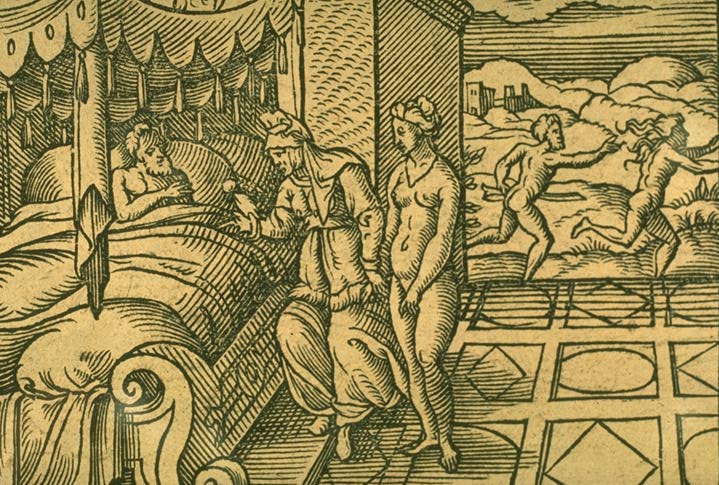
Virgil Solis, Myrrha and Cinyras, 1581
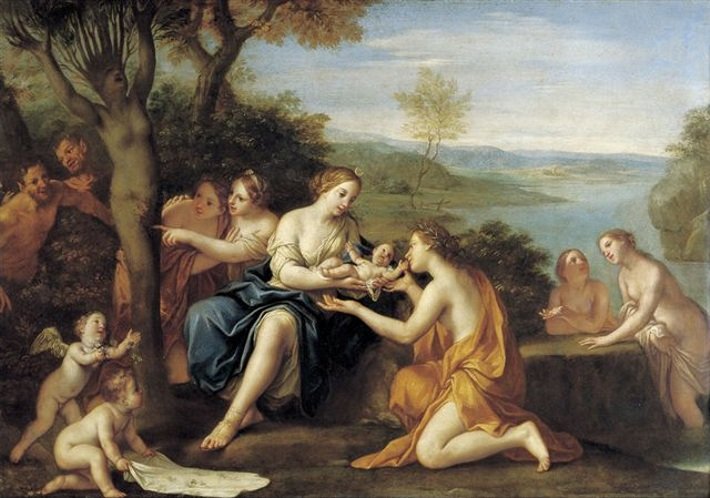
Marcantonio Franceschini, The Birth of Adonis, 1690
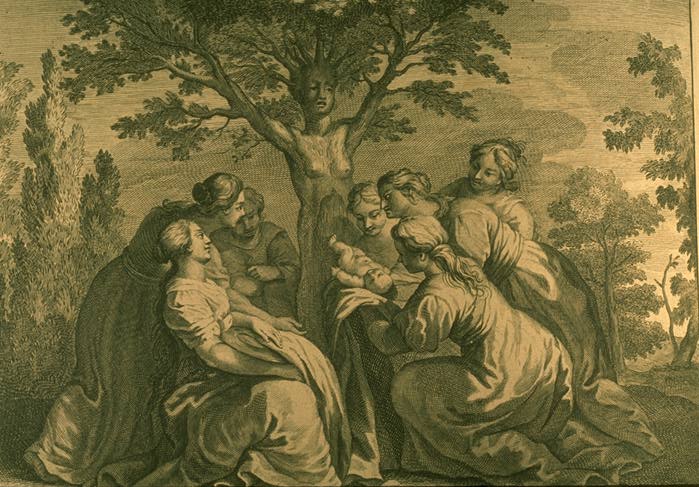
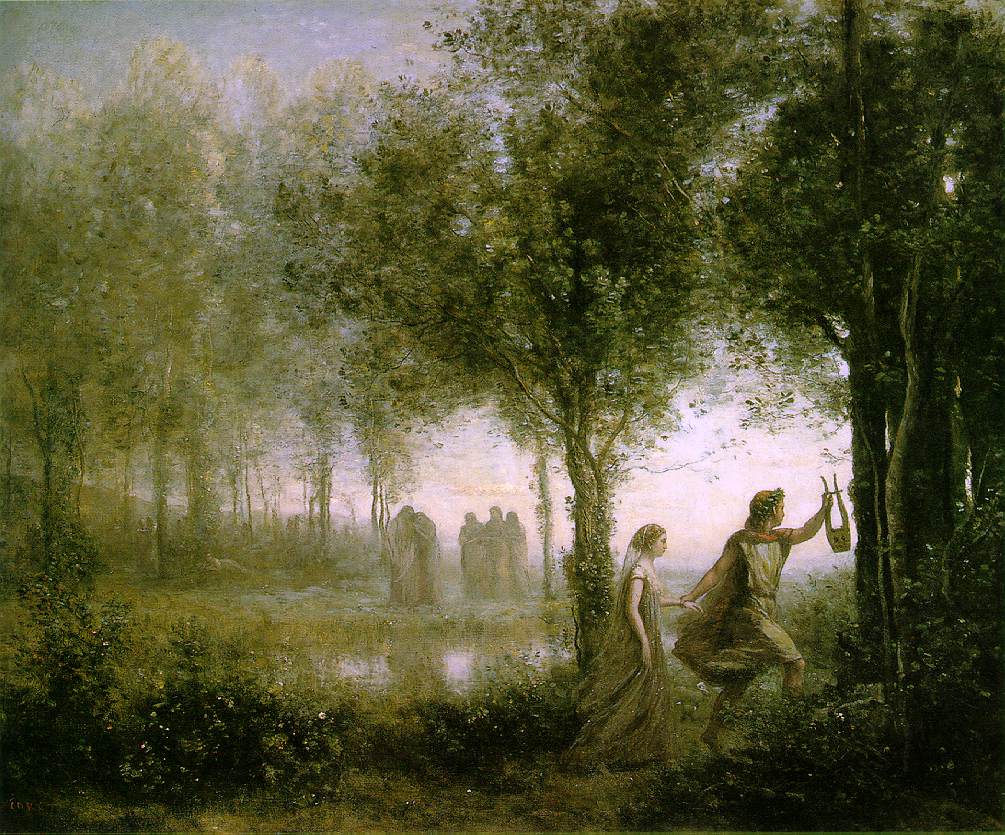
Jean-Baptiste-Camille Corot, Orpheus leading Euridice from the Underworld, 1861
Jean Leon Gerome, Pygmalion and Galatea, 1890
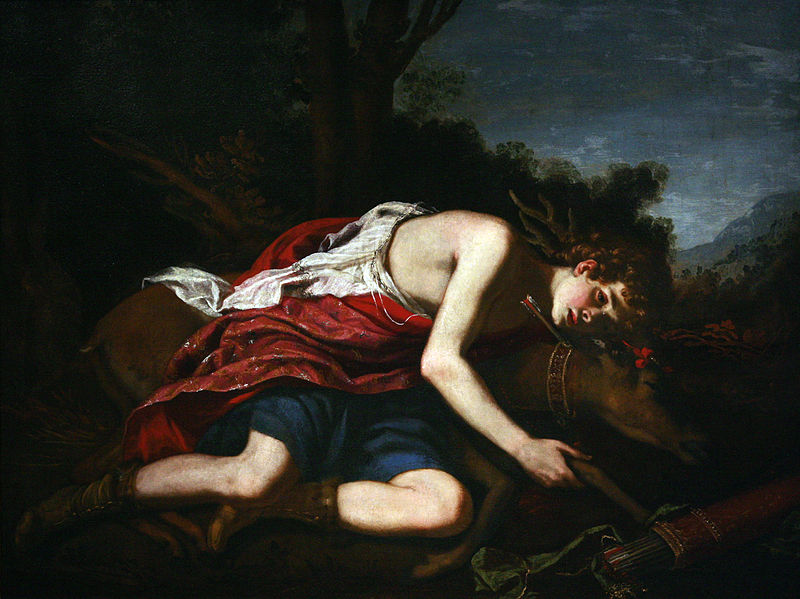
Jacopo Vignali, Cyparissus, 1670s
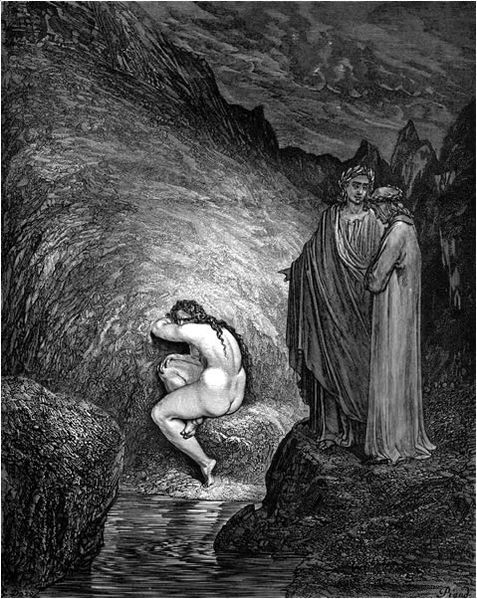
Gustave Dore, Myrrha in Hell, illustration for Dante's Divine Comedy, 1857
Bernard Picart, The Birth of Adonis, 1720s
